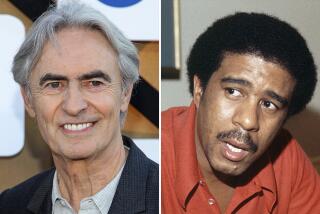Ban on Cable TV Sex Satire Raises Censorship Issue
- Share via
EL MONTE — Gary Campbell thought he would get a few laughs when he produced a satire on sexually suggestive television programming for Group W Cable’s community access channel here. But city officials did not find it very funny.
Campbell’s show, “News for the Sexually Obsessed,” was banned last month after being found in violation of the El Monte Cable Television Community Access Corp.’s obscenity guidelines.
Officials of other cities and the cable television industry believe that the ban is the first of its kind in the San Gabriel Valley, if not in all of Southern California.
Board Endorsed Ban
The ban was imposed by City Administrator Greg Korduner, acting as executive director of the access corporation, and was supported by the corporation’s board of directors, which is made up of the five members of the City Council. The corporation, a quasi-governmental agency, oversees the operation of the community access channel, which is open to virtually anyone in the community who wishes to produce or broadcast television programs.
Campbell’s seven-minute spot contains no nudity or profanity. But it is peppered with sexually oriented puns and innuendoes delivered by Campbell and three actors portraying broadcasters. All read suggestively written news stories while half submerged in a Jacuzzi. The show ends with a woman in a bathing suit delivering an anti-nuclear weapons editorial while hugging a fake missile.
Korduner said he banned the show under a provision of the cable corporation’s programming policy that states that material should not be cablecast if it “depicts or describes in a patently offensive manner sadomasochistic abuse or sexual conduct.”
Campbell, a free-lance writer in his early 30s, maintained that his show was no spicier than some on commercial television. “I was kind of overwhelmed by this censorship,” he said.
Korduner denied that his decision constituted censorship. “We set a policy of El Monte being a wholesome, family-oriented community and. . . . I just feel I was following (those) policies and guidelines,” he said.
Korduner said “News for the Sexually Obsessed” came to his attention in early March after a Group W program scheduler read the show’s title and decided its contents should be reviewed before being transmitted. Under its franchise agreement with the city, Group W provides equipment and training for people to produce programs for the access channel. Campbell and his co-stars used Group W gear to produce their show in the backyard of one of the cast members.
Endorsement Was Informal
City Council members, acting as the access corporation’s board of directors, did not vote on the matter, but informally endorsed Korduner’s ban without viewing the segment, said Councilman Ernest Gutierrez, chairman of the board.
“I haven’t seen the show, but I have a lot of faith in Greg’s judgment because the man is a family man and has very high ideals and values,” Gutierrez said. “He wants to have high-caliber and non-offensive type programming for our community.”
The issue of freedom of expression on community access channels represents a problem that cities have had to confront in recent years with the emergence of cable systems.
Sue Miller-Buske, executive director of the Washington, D.C.-based National Federation of Local Cable Programmers, said governmental or quasi-governmental censorship on access channels is “very, very rare.”
“There have been incidents of censorship, in most cases by the cable company, not by the local government,” she said. “When you’ve got the city manager and its board is made up of city officials, it’s a little difficult to say it’s not indirectly a government decision.”
A Higher Priority
But Gutierrez said his interest in maintaining acceptable programming on the access channel outweighs his concern over First Amendment issues.
“Adults using the freedom of speech clause (in the First Amendment) are pumping garbage into our kids,” he said. “This is not in the best interest of our kids and our community. We’re not afraid to confront anyone. We’re going to fight it if we have to go to court.”
Others, however, disagree.
Ken Caresio, city manager of Duarte, which owns its own cable system, said, “People have First Amendment rights and we have to respect that. Years back we had a movie house with hard-core (pornographic) stuff and we got into a lot of litigation (to close it), and what it came down to was you cannot have absolute restrictions. I think we would have a lot of trouble restricting content.”
There is disagreement among cable companies about how to deal with the situation.
Carlos Herrera, programming manager for Group W, which also serves Sierra Madre and northern Arcadia, said the cable company has not run into a problem with program content in other communities. Herrera said he did not object to the show, but added that Group W does not normally get involved in programming policy for community access channels.
“Group W merely serves as a cable casting conduit,” Herrera said. “That’s all we are.”
Cable Company Criticized
A manager for another cable company serving the San Gabriel Valley, who spoke on condition that his name not be used, criticized Group W for not supporting Campbell’s right to air the show on the public access channel.
“As a cable company,” he said, “we need to protect those rights. We spent a lot of time in Washington and Sacramento protecting those rights. Once you give those rights up, what’s to say they don’t come back and try to ban the Playboy channel (a commercial cable channel)?”
Bill Cullen, president of United Cable Television and head of the Southern California Cable Assn., said none of the association’s nearly 400 members has reported the censorship of locally produced programs. Cullen said he would opt to air marginal material late at night if the problem arose.
Meanwhile, Campbell showed the video to about 35 fellow members of the El Monte Cable Club at a meeting last week and most indicated by a hand vote that they disagreed with Korduner’s decision. The club is made up of residents who produce shows for the access channel. A few members suggested that the program be aired when most children would not be watching.
Other Show Tempered
Campbell and several other club members expressed concern over the issue of freedom of speech guaranteed in the First Amendment to the Constitution. After Campbell’s show was banned, another producer, Steve Lesh, said he tempered his video takeoff of Charles Dickens’ “A Christmas Carol” to ensure that it would be aired.
Campbell said he has no plans to fight the decision, but wants to clarify the access corporation’s position on censorship. Although “News for the Sexually Obsessed” has stirred considerable controversy, most programs on the access channel deal with more mundane topics, such as dental check-ups, golf and community services.
Campbell and some of his colleagues worried that contesting the decision would strain relations with Group W and the city and hinder future access to video equipment.
“We have to get along,” said Roger Kinion, who portrayed the anchor man in “News for the Sexually Obsessed.”
Said Campbell: “These people who banned the show are all nice people. But satire that doesn’t offend anyone is like tragedy that doesn’t make anybody sad and comedy that doesn’t make anybody laugh.”
More to Read
The complete guide to home viewing
Get Screen Gab for everything about the TV shows and streaming movies everyone’s talking about.
You may occasionally receive promotional content from the Los Angeles Times.






